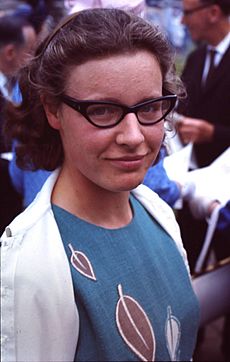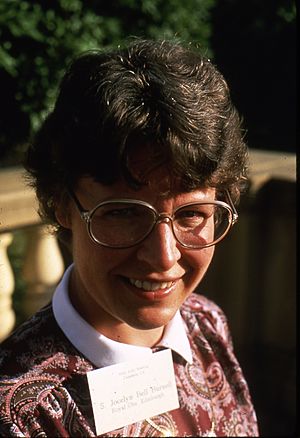Jocelyn Bell Burnell facts for kids
Quick facts for kids
Jocelyn Bell Burnell
|
|
|---|---|
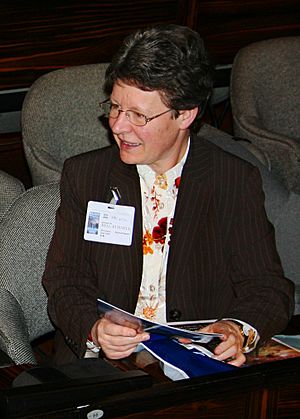
Bell Burnell in 2009
|
|
| Born |
Susan Jocelyn Bell
15 July 1943 Lurgan, County Armagh, Northern Ireland
|
| Nationality | British |
| Education |
|
| Alma mater |
|
| Known for | Co-discovering the first four pulsars |
| Spouse(s) |
Martin Burnell
(m. 1968; div. 1993) |
| Children | Gavin Burnell |
| Awards |
|
| Scientific career | |
| Fields | Astrophysics |
| Institutions | |
| Thesis | The Measurement of radio source diameters using a diffraction method (1968) |
| Doctoral advisor | Antony Hewish |
Dame Susan Jocelyn Bell Burnell DBE FRS FRSE FRAS FInstP (/bɜːrˈnɛl/; née Bell; born 15 July 1943) is an astrophysicist from Northern Ireland who, as a postgraduate student, discovered the first radio pulsars in 1967. The discovery eventually earned the Nobel Prize in Physics in 1974; however, she was not one of the prize's recipients.
Bell Burnell was president of the Royal Astronomical Society from 2002 to 2004, president of the Institute of Physics from October 2008 until October 2010, and interim president of the Institute following the death of her successor, Marshall Stoneham, in early 2011. She was Chancellor of the University of Dundee from 2018 to 2023.
In 2018, she was awarded the Special Breakthrough Prize in Fundamental Physics. Following the announcement of the award, she decided to use the $3 million (£2.3 million) prize money to establish a fund to help female, minority and refugee students to become research physicists. The fund is administered by the Institute of Physics.
In 2021, Bell Burnell became the second female recipient (after Dorothy Hodgkin in 1976) of the Copley Medal.
Contents
Early life and education
Born in Belfast, Northern Ireland, to G. Philip and M. Allison Bell. Their country home was called "Solitude" and she grew up there with her younger brother and two younger sisters. Her father was an architect who helped design the Armagh Planetarium, and during her visits there, the staff encouraged her to pursue a career in astronomy. She also enjoyed her father's books on astronomy.
She grew up in Lurgan and attended the Preparatory Department of Lurgan College from 1948 to 1956. At the time, boys could study technical subjects, but girls were expected to study subjects such as cooking and cross-stitching. Bell Burnell was able to study science only after her parents and others challenged the school's policies.
She failed the eleven-plus exam and her parents sent her to The Mount School, a Quaker girls' boarding school in York, England, where she graduated from in 1961.
Bell Burnell was the subject of the first part of the BBC Four three-part series Beautiful Minds, directed by Jacqui Farnham.
Career and research
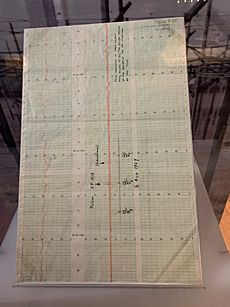
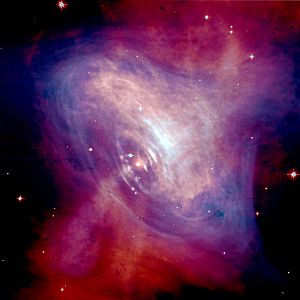
On 28 November 1967, while a postgraduate student at Cambridge, Bell Burnell detected a "bit of scruff" on her chart-recorder papers that tracked across the sky with the stars. The signal had been visible in data taken in August, but as the papers had to be checked by hand, it took her three months to find it. She established that the signal was pulsing with great regularity, at a rate of about one pulse every one and a third seconds. Temporarily dubbed "Little Green Man 1" (LGM-1) the source (now known as PSR B1919+21) was identified after several years as a rapidly rotating neutron star. This was later documented by the BBC Horizon series. In a 2020 lecture at Harvard, she related how the media was covering the discovery of pulsars, with interviews taking a standard "disgusting" format: Hewish would be asked on the astrophysics, and she would be the "human interest" part, asked about vital statistics, how many boyfriends she had, what colour is her hair, and asked to undo some buttons for the photographs. The Daily Telegraph science reporter shortened "pulsating radio source" to pulsar.
She worked at the University of Southampton between 1968 and 1973, University College London from 1974 to 82 and the Royal Observatory, Edinburgh (1982–91). From 1973 to 1987 she was a tutor, consultant, examiner, and lecturer for the Open University. In 1986, she became the project manager for the James Clerk Maxwell Telescope on Mauna Kea, Hawaii, a position she held until 1991. She was Professor of Physics at the Open University from 1991 to 2001. She was also a visiting professor at Princeton University in the United States and Dean of Science at the University of Bath (2001–04), and President of the Royal Astronomical Society between 2002 and 2004.
Bell Burnell was visiting professor of astrophysics at the University of Oxford, and a Fellow of Mansfield College in 2007. She was President of the Institute of Physics between 2008 and 2010. In February 2018 she was appointed Chancellor of the University of Dundee. In 2018, Bell Burnell visited Parkes, NSW, to deliver the keynote John Bolton lecture at the Central West Astronomical Society (CWAS) AstroFest event.
In 2018, she was awarded the Special Breakthrough Prize in Fundamental Physics, worth three million dollars (£2.3 million), for her discovery of radio pulsars. The Special Prize, in contrast to the regular annual prize, is not restricted to recent discoveries. She donated all of the money "to fund women, under-represented ethnic minority and refugee students to become physics researchers", the funds to be administered by the Institute of Physics.
Issued in July 2022, Ulster Bank's new science-themed polymer £50 bank note prominently features Bell Burnell alongside other women, including those working in NI's life sciences industry. She said, "I'm passionate about encouraging more women to pursue scientific careers and I think it's something that is very important for Northern Ireland. There is a burgeoning scientific sector here. More women pursuing careers in science will support that ongoing growth."
Awards
- The Albert A. Michelson Medal of the Franklin Institute of Philadelphia (1973, jointly with Dr. Hewish).
- J. Robert Oppenheimer Memorial Prize from the Center for Theoretical Studies, University of Miami (1978).
- Beatrice M. Tinsley Prize of the American Astronomical Society (1986).
- Herschel Medal of the Royal Astronomical Society (1989).
- Jansky Lectureship before the National Radio Astronomy Observatory (1995).
- Magellanic Premium of the American Philosophical Society (2000).
- Elected a Fellow of the Royal Society (FRS) (March 2003).
- Elected a Fellow of the Royal Society of Edinburgh (FRSE) (2004).
- William E. Gordon and Elva Gordon distinguished lecture at the Arecibo Observatory on 27 June 2006.
- The Grote Reber Medal at the General Assembly of the International Union of Radio Science (URSI) in Istanbul (19 August 2011)
- Lise-Meitner-Lecture at the Technical University Vienna (2013)
- The Royal Medal of the Royal Society (2015).
- The Women of the Year Prudential Lifetime Achievement Award (2015)
- The Institute of Physics President's Medal (2017)
- Grande Médaille of the French Academy of Sciences (2018)
- Special Breakthrough Prize in Fundamental Physics (2018). She donated the tree million dollar of the Breakthrough Prize to the Bell Burnell Scholarship Fund to promote greater diversity within the field of Physics.
- 23rd Annual Katzenstein Distinguished Lecture at the University of Connecticut (2019)
- Gold Medal of the Royal Astronomical Society (2021)
- The Royal Society's Copley Medal (2021)
- The Astronomische Gesellschaft's Karl Schwarzschild Medal (2021)
- The Prix Jules Janssen of the Société astronomique de France (2022)
Honours
- In 1999, she was appointed Commander of the Order of the British Empire (CBE) for services to Astronomy and promoted to Dame Commander of the Order of the British Empire (DBE) in 2007.
- In February 2013, she was assessed as one of the 100 most powerful women in the United Kingdom by Woman's Hour on BBC Radio 4.
- She was recognized as one of the BBC's 100 women of 2014.
- In February 2014, she was elected President of the Royal Society of Edinburgh, the first woman to hold that office. She held the position from April 2014 to April 2018 when she was succeeded by Dame Anne Glover.
- In 2016, the Institute of Physics renamed their award for early-career female physicists the Jocelyn Bell Burnell Medal and Prize.
- In 2016, she was elected an International member of the American Philosophical Society.
- In 2020, she was elected a Legacy Fellow of the American Astronomical Society.
- A painting of her by Stephen Shankand, commissioned by the Royal Society, was added to the collection in the Society's Carlton House Terrace headquarters in November 2020.
- In 2020, she was included by the BBC in a list of seven important but little-known British female scientists.
- In 2020, she was made an Honorary Fellow of Trinity College Dublin.
- In 2023, she was awarded the Royal Irish Academy's Cunningham Medal and the 2022 Prix Jules Janssen from the Société astronomique de France.
Publications
Her publications include:
Personal and non-academic life
Bell Burnell is house patron of Burnell House at Cambridge House Grammar School in Ballymena. She has campaigned to improve the status and number of women in professional and academic posts in the fields of physics and astronomy.
Quaker activities and beliefs
From her school days, she has been an active Quaker and served as Clerk to the sessions of Britain Yearly Meeting in 1995, 1996 and 1997. Bell Burnell also served as Clerk of the Central Executive Committee of Friends World Committee for Consultation from 2008 to 2012. She delivered a Swarthmore Lecture under the title Broken for Life, at Yearly Meeting in Aberdeen on 1 August 1989, and was the plenary speaker at the US Friends General Conference Gathering in 2000. She spoke of her personal religious history and beliefs in an interview with Joan Bakewell in 2006.
Bell Burnell served on the Quaker Peace and Social Witness Testimonies Committee, which produced Engaging with the Quaker Testimonies: a Toolkit in February 2007. In 2013 she gave a James Backhouse Lecture which was published in a book entitled A Quaker Astronomer Reflects: Can a Scientist Also Be Religious?, in which Burnell reflects about how cosmological knowledge can be related to what the Bible, Quakerism or Christian faith states.
Marriage
In 1968, between the discovery of the second and third pulsar, Bell became engaged to Martin Burnell and they married soon after; the couple divorced in 1993 after separating in 1989. In a 2021 online lecture at the University of Bedfordshire, Bell Burnell reflected on her first experience returning to the observatory wearing an engagement ring. Though she was proud of her ring and wanted to share the good news with her colleagues, she instead received criticism as, at the time, it was shameful for women to work as it appeared that their partners were incapable of providing for the family. Her husband was a local government officer, and his career took them to various parts of Britain. She worked part-time for many years while raising their son, Gavin Burnell, who is a member of the condensed matter physics group at the University of Leeds.
See also
 In Spanish: Jocelyn Bell Burnell para niños
In Spanish: Jocelyn Bell Burnell para niños
- Timeline of women in science
- Nobel Prize controversies


